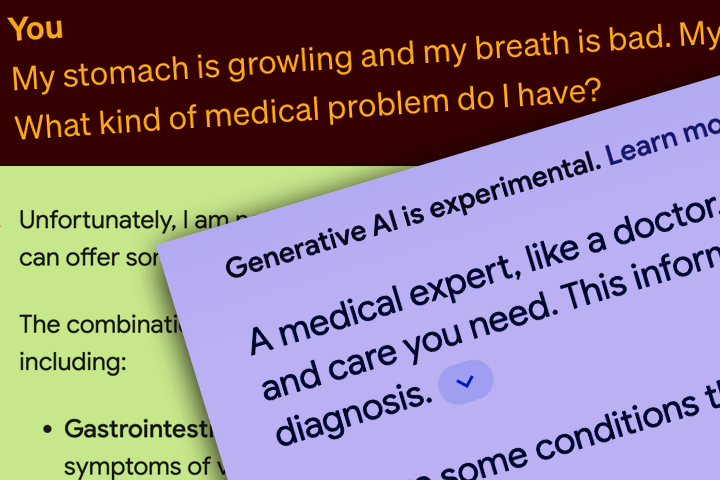
Of all the things artificial intelligence (AI) chatbots – like ChatGPT, Google, and Bard – can do, there’s growing concern that putting too much stock in the responses you receive based on your health symptoms could lead you down the wrong path.
Yes, they may have the potential to transform healthcare. But “may” is not now and “may” is far from accurate. Just ask the researchers who fed ChatGPT 100 different scenarios. The results? The diagnoses were accurate only 17% of the time.
Another bot that got it horribly wrong was the London-based Babylon, which offered virtual primary care and chatbot-style symptom checkers. As a result of misleading claims about the accuracy of its technology, the $4 billion company was shut down last year.
“AI systems, especially AI chat boxes, have been becoming increasingly popular recently. While they are helpful in many things, there are certain limitations that come with AI systems, particularly if you are looking for medical advice or diagnosis,” Dr. Saam Zarrabi, CEO of Rodeo Dental & Orthodontics, told ConsumerAffairs.
Where AI misses the mark
One of the biggest problems that people can encounter when using Bard or ChatGPT is that those tools only know what’s been written and because of that, are pretty much a one-dimensional feedback machine.
Dr. Nathan Goodyear, the medical director at Brio Medical, a holistic, integrative cancer healing center in Scottsdale, Ariz., reminds people that medicine is the blend of the art and science of medicine and without the human factors of vision, touch, smell, taste, and hearing, that art will be lost.
“The loss of one of these two pillars, art or science, will result in the fall, better the complete collapse of the practice of medicine," Goodyear said. "Without ChatGPT AI, the art of medicine was fast approaching extinction. The full embrace will stick a fork in the art of medicine— driving a stake in the heart of the human experience in medicine.”
ChatGPT, Bard, and Google have their own warnings
None of the major online AI tools ConsumerAffairs researched had the guts to go out on a limb and try and diagnose any combination of symptoms that we threw at them – from red, scaly patches on our feet to tingling teeth to a growling stomach.
“I'm not able to provide medical advice, and diagnosing a rash is best left to a healthcare professional. It's important to seek proper medical attention for any concerning skin conditions, especially those that affect weight-bearing areas like the foot” or a variety thereof was the first thing all of the chatbots told us.
The bots did, however, generalize some possibilities of what was going on – such as GERD for the stomach issue and Psoriasis for the foot problem – probably to make you feel like it had some intellect. But in every single instance, the bots repeated their “limitations” mantra.
“These are just a few possibilities, and there could be other underlying causes. It's crucial to consult with a healthcare professional to determine the specific cause of your symptoms and receive appropriate advice or treatment. If your symptoms are severe or persistent, seek medical attention promptly,” was ChatGPT’s sign-off.
We already have online tools that work, says one doctor.
Dr. Menka Gupta, a functional medicine doctor at Nutranourish, suggests that the two online models people have been using for the last decade or so are more reliable.
“If someone wants to triage their illness at home, they can use symptom checker tools from reputable resources like the Mayo Clinic or the WebMD,” Gupta suggests, but then raises a yellow flag worth noting.
“It is important to understand that there are limitations in using these websites.”
Photo Credit: Consumer Affairs News Department Images
Posted: 2024-01-16 11:57:33


















